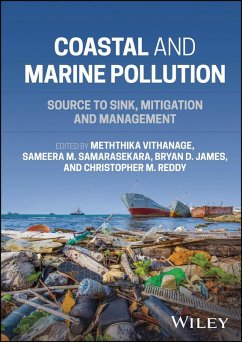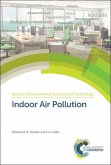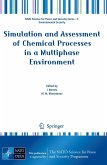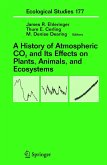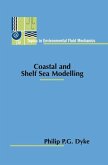VithanageSource to Sink, Mitigation and Management
Coastal and Marine Pollution
Source to Sink, Mitigation and Management
Herausgeber: Vithanage, Meththika; Reddy, Christopher M; James, Bryan D; Samarasekara, Sameera M
VithanageSource to Sink, Mitigation and Management
Coastal and Marine Pollution
Source to Sink, Mitigation and Management
Herausgeber: Vithanage, Meththika; Reddy, Christopher M; James, Bryan D; Samarasekara, Sameera M
- Gebundenes Buch
- Merkliste
- Auf die Merkliste
- Bewerten Bewerten
- Teilen
- Produkt teilen
- Produkterinnerung
- Produkterinnerung
A multi-faceted analysis of how to preserve the long-term health of the world's largest ecosystem In Coastal and Marine Pollution: Source to Sink, Mitigation and Management, a team of distinguished researchers delivers a comprehensive overview of the factors and stakeholders impacting - and impacted by - coastal and marine pollution. The book offers broad and up-to-date coverage of the topic, serving as a valuable reference for professionals and researchers working in the field. The authors integrate and compare the two main sources of marine and coastal pollution: chronic, long-term,…mehr
Andere Kunden interessierten sich auch für
![Reviews of Environmental Contamination and Toxicology 187 Reviews of Environmental Contamination and Toxicology 187]() George Ware (ed.)Reviews of Environmental Contamination and Toxicology 18780,99 €
George Ware (ed.)Reviews of Environmental Contamination and Toxicology 18780,99 €![Indoor Air Pollution Indoor Air Pollution]() Indoor Air Pollution85,99 €
Indoor Air Pollution85,99 €![Fish Species in Environmental Risk Assessment Strategies Fish Species in Environmental Risk Assessment Strategies]() Fish Species in Environmental Risk Assessment Strategies195,99 €
Fish Species in Environmental Risk Assessment Strategies195,99 €![Air Pollution XXVII Air Pollution XXVII]() Air Pollution XXVII190,99 €
Air Pollution XXVII190,99 €![Simulation and Assessment of Chemical Processes in a Multiphase Environment Simulation and Assessment of Chemical Processes in a Multiphase Environment]() Simulation and Assessment of Chemical Processes in a Multiphase Environment226,99 €
Simulation and Assessment of Chemical Processes in a Multiphase Environment226,99 €![A History of Atmospheric CO2 and Its Effects on Plants, Animals, and Ecosystems A History of Atmospheric CO2 and Its Effects on Plants, Animals, and Ecosystems]() James R. Ehleringer / Thure E. Cerling / M.Denise Dearing (eds.)A History of Atmospheric CO2 and Its Effects on Plants, Animals, and Ecosystems203,99 €
James R. Ehleringer / Thure E. Cerling / M.Denise Dearing (eds.)A History of Atmospheric CO2 and Its Effects on Plants, Animals, and Ecosystems203,99 €![Coastal and Shelf Sea Modelling Coastal and Shelf Sea Modelling]() Philip P. G. DykeCoastal and Shelf Sea Modelling77,99 €
Philip P. G. DykeCoastal and Shelf Sea Modelling77,99 €-
-
-
A multi-faceted analysis of how to preserve the long-term health of the world's largest ecosystem In Coastal and Marine Pollution: Source to Sink, Mitigation and Management, a team of distinguished researchers delivers a comprehensive overview of the factors and stakeholders impacting - and impacted by - coastal and marine pollution. The book offers broad and up-to-date coverage of the topic, serving as a valuable reference for professionals and researchers working in the field. The authors integrate and compare the two main sources of marine and coastal pollution: chronic, long-term, low-level pollution as well as occasional, accidental, disaster-related pollution. They bridge the gap between theory and real-world action, offering best practices for monitoring and preventing pollution, as well as efficient governance and disaster management strategies. Readers will find: * A thorough overview of the global state of coastal and marine pollution * Comprehensive explorations of different types of pollution, including their sources, distribution, and impacts on the biophysical environment * Practical discussions of pollution monitoring methods, including ecotoxicological approaches and proven strategies for managing coastal and marine pollution * A critical assessment of policy and governance issues, including public awareness and disaster response strategies Perfect for researchers and professionals in the fields of marine biology, ecology, and environmental protection, Coastal and Marine Pollution will also benefit professionals working in the shipping, fishing, deep-sea mining and drilling industries, as well as those affiliated with governmental and non-governmental organizations.
Produktdetails
- Produktdetails
- Verlag: Wiley
- Seitenzahl: 560
- Erscheinungstermin: 14. April 2025
- Englisch
- Abmessung: 256mm x 186mm x 34mm
- Gewicht: 1304g
- ISBN-13: 9781394236992
- ISBN-10: 1394236999
- Artikelnr.: 71778230
- Herstellerkennzeichnung
- Libri GmbH
- Europaallee 1
- 36244 Bad Hersfeld
- gpsr@libri.de
- Verlag: Wiley
- Seitenzahl: 560
- Erscheinungstermin: 14. April 2025
- Englisch
- Abmessung: 256mm x 186mm x 34mm
- Gewicht: 1304g
- ISBN-13: 9781394236992
- ISBN-10: 1394236999
- Artikelnr.: 71778230
- Herstellerkennzeichnung
- Libri GmbH
- Europaallee 1
- 36244 Bad Hersfeld
- gpsr@libri.de
Meththika Vithanage is a Professor of Natural Resources and a founding Director at the Ecosphere Resilience Research Centre, University of Sri Jayewardenepura in Sri Lanka. Sameera M. Samarasekara is a Senior Lecturer of Civil Engineering at the University of Sri Jayewardenepura in Sri Lanka. Bryan D. James is an Assistant Professor in the Department of Chemical Engineering at Northeastern University in Boston, Massachusetts, USA. Christopher M. Reddy is a Senior Scientist in the Department of Marine Chemistry and Geochemistry at the Woods Hole Oceanographic Institution in the United States.
Notes on Editors xix List of Contributors xxi Preface xxvii Acknowledgment xxix 1 Overview of Coastal and Marine Pollution: Sources, Impacts, and Challenges 1 Gohagodage Nirmal Tharanga Jayalath and Amila Sandaruwan Ratnayake 1.1 Introduction 1 1.2 Pollution in Coastal and Marine Environments 2 1.3 Sources of Coastal and Marine Pollution 3 1.4 Impacts of Coastal and Marine Pollution 11 1.5 Challenges in Coastal and Marine Pollution 15 1.6 Summary 19 References 19 2 Pollution from Land-Based Sources: Industrial and Urban Runoff 27 Mihiri Indunil Gunasekara, Ishani Mahawaththa, Dilani Madhubhashini, and Kaushani Amarasena 2.1 Organic Marine and Coastal Pollutants 27 2.2 Inorganic Marine and Coastal Pollutants 28 2.3 Newer Forms of Marine and Coastal Pollutants 29 2.4 Climate Change and Marine and Coastal Pollution 30 2.5 Pollutant Transport from Land-Based Sources 31 2.6 Sources of Marine Pollution 35 2.7 Effects Related to Marine Pollution 37 References 39 3 Marine Pollution Issues Relating to Shipping, Ports, and Use of Marine Coatings 45 Christopher W. Haley and R. John Morrison 3.1 Introduction 45 3.2 Marine Pollution from Shipping 47 3.3 Pollution from Ship Wastes 52 3.4 Sewage 56 3.5 Ship Collisions and Pollution 57 3.6 Ports 58 3.7 Marine Coatings 61 3.8 Conclusions 62 References 63 4 Offshore Oil and Gas Operations: Environmental Impacts and Mitigation Methods 67 Savinda Arambawatta Lekamge, Ishani Mahawaththa, and S.D.N.A.M.A.M. Weerasinghe 4.1 Introduction 67 4.2 Global Status of Offshore Oil and Gas Explorations 68 4.3 Processes/Methods Involved in Offshore Oil and Gas Operations 70 4.4 Environmental Impacts 76 4.5 Mitigation Methods 81 4.6 Conclusions 83 References 83 5 Coastal and Marine Pollution from Agricultural Activities: Fertilizers and Pesticides 89 Jithya Wijesinghe, Shermila M. Botheju, and Nalika R. Dayananda 5.1 Introduction 89 5.2 Current Status and Trends in Use of Fertilizer and Pesticides in Agriculture 90 5.3 Pesticide Distribution in Coastal and Marine Environment 90 5.4 Pesticide Entering Pathways to Coastal and Marine Environment 91 5.5 Fertilizer Use and Losses from Agricultural Land to Coastal and Marine Environment 92 5.6 Impact on the Coastal and Marine Environment of Agrochemicals 93 5.7 Impacts of Agrarian-Based Synthetic Fertilizers and Pesticides on Marine and Coastal Life and Human Health 95 5.8 Impact on the Blue Economy 98 5.9 Innovative Solutions to Control and Prevent Coastal and Marine Pollution from Agricultural Activities 101 5.10 Innovative Solutions and Future Challenges 104 References 105 6 Ocean Warming, Acidification, Plastic Pollution, and Water Quality Deterioration: A Multifaceted Crisis Unveiled 111 Nalika R. Dayananda, Jithya Wijesinghe, Shermila M. Botheju, W.P.R.T. Perera, and J.A. Liyanage 6.1 Ocean Warming: Impact on Global Ocean System and Cryosphere 111 6.2 Water Quality Deterioration in Oceans 116 6.3 Ocean Acidification 120 6.4 Plastic Pollution 125 6.5 Cross-Disciplinary Solutions for Interconnected Nature of Ocean Warming Acidification, Plastic Pollution, and Water Quality Deterioration 131 6.6 Conclusion 132 References 132 7 Heavy Metal Pollution and Historical Legacies in Coastal-Marine Environment 139 Chamila Jinendra Nanayakkara, Nimila Dushyantha, Pubudi Dilshara, Nadeera Batapola, Nalin Ratnayake, Ranjith Premasiri, and Bandara Abeysinghe 7.1 Introduction 139 7.2 Evolution of Heavy Metal Pollution in Coastal and Marine Environments 140 7.3 Case Studies on Historical Legacies of Heavy Metal Contamination in Coastal and Marine Environments 142 7.4 Heavy Metals and Their Essentiality in the Environment 146 7.5 Prevention and Management of Heavy Metal Pollution in Coastal and Marine Environments 151 7.6 Conclusion 154 7.7 Future Directives 155 Acknowledgment 155 References 155 8 Marine Pollution due to Mariculture and Fishing Operations in Sri Lanka: Impacts and Mitigation Strategies 163 Menuka Udugama, Lahiru Udayanga, Suchima Gonapinuwala, and Dileepa de Croos 8.1 Mariculture in Sri Lanka 163 8.2 Marine Pollution by Aquaculture and Fisheries Practices and Impacts 165 8.3 Nutrient Pollution and Impacts from Fisheries and Mariculture Practices 165 8.4 Oil Pollution and Impacts from Fisheries and Mariculture Practices 168 8.5 Chemical Pollution and Impacts from Fisheries and Mariculture Practices 169 8.6 Plastic Pollution and Impacts from Fisheries and Mariculture Practices 170 8.7 Policy Framework Governing the Mariculture Sector in Sri Lanka 173 8.8 Potential Mitigation Measures, Approaches and Way Forward 174 References 176 9 Marine Macro-litter: Sources, Abundance, Impacts, and Solutions 183 Minh-Ky Nguyen 9.1 Introduction 183 9.2 Sources, Fate, and Transport of Marine Macro-litter 184 9.3 Abundance and Distribution of Marine Macro-litter 185 9.4 Impacts of Marine Macro-litter 187 9.5 Solution Approaches Toward Sustainable Marine Ecosystem 190 9.6 Conclusions and Recommendations 191 References 191 10 Nuclear and Radioactive Marine Pollution and Monitoring of Radioactivity in Oceans 197 R.M.N. Priyanga Rathnayake and Dulanjalee Rajapaksha 10.1 Introduction 197 10.2 Sources of Radioactivity in Marine Ecosystems 197 10.3 Important Radionuclides to the Marine Ecosystems, Their Chemistry, and Behaviors 205 10.4 Impact of Radioactive and Nuclear Pollution on Marine Ecosystem 206 10.5 Monitoring of Radioactivity in Oceans and Marine-Originated Products 209 10.6 Preventive Measures on Radioactive and Nuclear Marine Pollution 211 References 213 11 GIS-Based Gray Water Footprint (GWF) Assessment of Coastal and Marine Pollution: A Minimization Approach 217 Pelin Soyertä Yap
c
og
lu, Abdullah I
zeddin Karabulut, and Mehmet I
fan Yes
ilnacar 11.1 Introduction 217 11.2 Gray Water Footprint of Coastal and Marine Pollution 218 11.3 Integration of GIS and GWF Methods 218 11.4 GIS Solutions for Marine and Coastal Pollution Management 219 11.5 3D Analyst 220 11.6 Conclusions 222 References 222 12 Underestimated Threats: Personal Care Products (PCPs) in Marine and Coastal Environments 225 Madhuni Madhushika Wijesooriya, Meththika Vithanage, and Hasintha Wijesekara 12.1 Introduction 225 12.2 Sources and Environmental Fate of PCPs in Marine and Coastal Environments 227 12.3 Active Ingredients of Concern in PCPs 230 12.4 Consequences to Marine and Coastal Ecosystems 231 12.5 Risks to Humans via Seafood Consumption 237 12.6 Prevention and Mitigation Strategies 237 12.7 Conclusions and Future Remarks 239 References 239 13 Monitoring and Assessment of Coastal and Marine Pollution: Methods and Technologies 249 G.K.M.R. Peter, S.M. Dassanayake, C.L. Jayawardena, and I. Mahakalanda 13.1 Introduction 249 13.2 Bibliographic Review 251 13.3 Remote Sensing in Coastal and Marine Pollution Monitoring 254 13.4 Marine Pollution Assessment 261 13.5 Discussion 265 13.6 Concluding Remarks 266 References 266 14 Toxicological Techniques for Coastal and Marine Pollution Monitoring 269 Siddihalu Lakshitha Madunil and Jithya Wijesinghe 14.1 Introduction 269 14.2 Toxicity Testing 271 14.3 Endpoints and Biomarkers 272 14.4 Sediment Toxicity Tests 273 14.5 Impacts of Pollution on Different Marine Species 274 14.6 Biomonitors and Bioindicators 274 14.7 Bioassays 277 14.8 Biomarker Analysis 280 14.9 Biosensors 284 14.10 Chemical Analysis 286 14.11 Histopathology 288 14.12 Ecotoxicological Surveys 289 14.13 Toxicogenomics 290 14.14 Integrated Monitoring Techniques 290 14.15 Conclusion 291 References 292 15 Marine Sediment Remediation Through Tiered Risk Assessment Approach 305 Divya Pal and Jonas Gunnarsson 15.1 Introduction 305 15.2 Sediment Remediation Techniques 307 15.3 Risk Assessment-Based Strategy 311 15.4 Conclusions 315 Acknowledgment 316 References 316 16 Biochar Application for Mitigation of Coastal and Marine Pollution: An Experimental Modeling 321 Pelin Soyertä Yap
c
o
lu 16.1 Introduction 321 16.2 Materials and Methods 322 16.3 Results and Discussion 324 16.4 Conclusion 326 References 326 17 Coastal and Marine Plastic Pollution Monitoring and Control Using Remote Sensing (RS) and Artificial Intelligence (AI) Technologies 329 Iddamalgoda Jayawardenage Judi Udari Nisansala Perera, Ranepura Dewage Charuka Sandaruwan, and Bellanthudawage Kushan Aravinda Bellanthudawa 17.1 Introduction 329 17.2 Challenges of In Situ Visual Monitoring of Plastic Litter in Marine and Coastal Ecosystems 330 17.3 Remote Sensing (RS) Approaches for Monitoring Marine and Coastal Environments 330 17.4 Methods for Mapping Marine Plastic Litter from Remote Sensing Data: Object-Based Image Analysis (OBIA) Using Machine Learning (ML) and Deep Learning (DL) 335 17.5 Challenges Using RS/AI Technologies to Detect Marine Plastics 340 17.6 Conclusion 341 References 342 18 Policy and Governance Approaches for Coastal and Marine Pollution Management 347 Chandrasekara SSK 18.1 Introduction 347 18.2 Institutional Arrangement for the Coast and Marine Resources Management in Sri Lanka 349 18.3 The Necessity of Governance Approaches to Increase the Effectiveness of Coastal and Marine Pollution Control in Sri Lanka 353 18.4 Conclusion and the Way Forward 355 References 356 19 Impact of Climate Change on Marine Ecosystems 359 Leneka Terika Rhoden 19.1 Introduction 359 19.2 Implications of Anthropogenic Climate Change on Marine Ecosystems 359 19.3 Linear Graph Showing Annual Global Sea-Surface Temperature Anomalies from 1880 to 2015 360 19.4 Conceptual Framework 363 19.5 Marine Life and Physical Characteristics of Oceans 365 19.6 Spatial Variability in Temperature Change 366 19.7 Resulting Biological Disruptions in Marine Ecosystems 368 19.8 Pelagic Ecosystems and Climate Dynamics 369 19.9 Coral Reefs and Ocean Acidification 371 19.10 Climate Migration and Adaptation in Marine Organisms 374 19.11 Case Study: Influx of Sargassum across the Caribbean 375 19.12 Management and Government Policies for Marine Ecosystems: The Way Forward 377 19.13 Conclusions and Key Recommendations 378 References 379 20 X-Press Pearl Disaster 389 Uswatta Liyanage Harsha Prabath Perera, and Amila Sandaruwan Ratnayake 20.1 Introduction 389 20.2 The MV X-Press Pearl Cargo Vessel 392 20.3 The Environmental Impacts of the X-Press Pearl Maritime Debacle 392 20.4 The Socioeconomic Impacts After the X-Press Pearl Disaster 398 20.5 Conclusion 398 References 399 21 Container Overboard in the Port of New Orleans, LA, USA: The Response and Cleanup of the 2020 Bianca Pellet Spill 403 Bryan D. James and Christopher M. Reddy 21.1 Introduction 403 21.2 Materials and Methods 404 21.3 Results and Discussion 406 21.4 Understanding the Fate of the Nurdles Following the Spill 410 References 419 22 Unleashing Potential: Transcending Marine Pollution Forecasts for a Better Future and Critical Thresholds 425 Sandun Dassanayake, Udari Perera, and Mahinsasa Rathnayake 22.1 Introduction 425 22.2 Critical Thresholds in Marine Life 2030 Program 426 22.3 Major Marine Pollution Sources 426 22.4 Remote Sensing-Based Monitoring 431 22.5 Biomonitoring 432 22.6 Data-Driven Assessment Techniques 433 22.7 Critical Thresholds: Challenges, Opportunities, and Future Directions 436 References 443 23 Impacts of Coastal and Marine Pollution on the Blue Economy: Integrating Blue Finance Perspectives 447 Gayithri Niluka Kuruppu, Nimila Dushyantha, Panchala Weerakoon, Gayan Amarasooriya, Titus Cooray, and Harshi Jayasingha 23.1 Introduction 447 23.2 Impacts of the Coastal and Marine Pollution on Main Pillars of the Blue Economy 449 23.3 The Economic Toll of Marine and Coastal Pollution on the Blue Economy 454 23.4 Blue Finance for Investing in a Sustainable Maritime Future 455 23.5 Conclusion 459 Acknowledgement 459 References 459 24 Macro Issues of Microplastics: Present Status and Future Challenges 465 Wijetunge, D.S., Perera, S.P.K.K.A., Karunathilake, N.M.O.A., and Ranatunga, R.R.M.K.P. 24.1 Microplastics (MPs): The Global Pollutant 465 24.2 Importance of Standardized MP Assessments and Accuracy in Data Acquisition 470 24.3 Economics of Waste Management 478 24.4 Mitigating MP Pollution: Sustainable Approaches, Circular Economy, and Policymaking 481 24.5 Conclusion 486 References 486 Index 495
c
og
lu, Abdullah I
zeddin Karabulut, and Mehmet I
fan Yes
ilnacar 11.1 Introduction 217 11.2 Gray Water Footprint of Coastal and Marine Pollution 218 11.3 Integration of GIS and GWF Methods 218 11.4 GIS Solutions for Marine and Coastal Pollution Management 219 11.5 3D Analyst 220 11.6 Conclusions 222 References 222 12 Underestimated Threats: Personal Care Products (PCPs) in Marine and Coastal Environments 225 Madhuni Madhushika Wijesooriya, Meththika Vithanage, and Hasintha Wijesekara 12.1 Introduction 225 12.2 Sources and Environmental Fate of PCPs in Marine and Coastal Environments 227 12.3 Active Ingredients of Concern in PCPs 230 12.4 Consequences to Marine and Coastal Ecosystems 231 12.5 Risks to Humans via Seafood Consumption 237 12.6 Prevention and Mitigation Strategies 237 12.7 Conclusions and Future Remarks 239 References 239 13 Monitoring and Assessment of Coastal and Marine Pollution: Methods and Technologies 249 G.K.M.R. Peter, S.M. Dassanayake, C.L. Jayawardena, and I. Mahakalanda 13.1 Introduction 249 13.2 Bibliographic Review 251 13.3 Remote Sensing in Coastal and Marine Pollution Monitoring 254 13.4 Marine Pollution Assessment 261 13.5 Discussion 265 13.6 Concluding Remarks 266 References 266 14 Toxicological Techniques for Coastal and Marine Pollution Monitoring 269 Siddihalu Lakshitha Madunil and Jithya Wijesinghe 14.1 Introduction 269 14.2 Toxicity Testing 271 14.3 Endpoints and Biomarkers 272 14.4 Sediment Toxicity Tests 273 14.5 Impacts of Pollution on Different Marine Species 274 14.6 Biomonitors and Bioindicators 274 14.7 Bioassays 277 14.8 Biomarker Analysis 280 14.9 Biosensors 284 14.10 Chemical Analysis 286 14.11 Histopathology 288 14.12 Ecotoxicological Surveys 289 14.13 Toxicogenomics 290 14.14 Integrated Monitoring Techniques 290 14.15 Conclusion 291 References 292 15 Marine Sediment Remediation Through Tiered Risk Assessment Approach 305 Divya Pal and Jonas Gunnarsson 15.1 Introduction 305 15.2 Sediment Remediation Techniques 307 15.3 Risk Assessment-Based Strategy 311 15.4 Conclusions 315 Acknowledgment 316 References 316 16 Biochar Application for Mitigation of Coastal and Marine Pollution: An Experimental Modeling 321 Pelin Soyertä Yap
c
o
lu 16.1 Introduction 321 16.2 Materials and Methods 322 16.3 Results and Discussion 324 16.4 Conclusion 326 References 326 17 Coastal and Marine Plastic Pollution Monitoring and Control Using Remote Sensing (RS) and Artificial Intelligence (AI) Technologies 329 Iddamalgoda Jayawardenage Judi Udari Nisansala Perera, Ranepura Dewage Charuka Sandaruwan, and Bellanthudawage Kushan Aravinda Bellanthudawa 17.1 Introduction 329 17.2 Challenges of In Situ Visual Monitoring of Plastic Litter in Marine and Coastal Ecosystems 330 17.3 Remote Sensing (RS) Approaches for Monitoring Marine and Coastal Environments 330 17.4 Methods for Mapping Marine Plastic Litter from Remote Sensing Data: Object-Based Image Analysis (OBIA) Using Machine Learning (ML) and Deep Learning (DL) 335 17.5 Challenges Using RS/AI Technologies to Detect Marine Plastics 340 17.6 Conclusion 341 References 342 18 Policy and Governance Approaches for Coastal and Marine Pollution Management 347 Chandrasekara SSK 18.1 Introduction 347 18.2 Institutional Arrangement for the Coast and Marine Resources Management in Sri Lanka 349 18.3 The Necessity of Governance Approaches to Increase the Effectiveness of Coastal and Marine Pollution Control in Sri Lanka 353 18.4 Conclusion and the Way Forward 355 References 356 19 Impact of Climate Change on Marine Ecosystems 359 Leneka Terika Rhoden 19.1 Introduction 359 19.2 Implications of Anthropogenic Climate Change on Marine Ecosystems 359 19.3 Linear Graph Showing Annual Global Sea-Surface Temperature Anomalies from 1880 to 2015 360 19.4 Conceptual Framework 363 19.5 Marine Life and Physical Characteristics of Oceans 365 19.6 Spatial Variability in Temperature Change 366 19.7 Resulting Biological Disruptions in Marine Ecosystems 368 19.8 Pelagic Ecosystems and Climate Dynamics 369 19.9 Coral Reefs and Ocean Acidification 371 19.10 Climate Migration and Adaptation in Marine Organisms 374 19.11 Case Study: Influx of Sargassum across the Caribbean 375 19.12 Management and Government Policies for Marine Ecosystems: The Way Forward 377 19.13 Conclusions and Key Recommendations 378 References 379 20 X-Press Pearl Disaster 389 Uswatta Liyanage Harsha Prabath Perera, and Amila Sandaruwan Ratnayake 20.1 Introduction 389 20.2 The MV X-Press Pearl Cargo Vessel 392 20.3 The Environmental Impacts of the X-Press Pearl Maritime Debacle 392 20.4 The Socioeconomic Impacts After the X-Press Pearl Disaster 398 20.5 Conclusion 398 References 399 21 Container Overboard in the Port of New Orleans, LA, USA: The Response and Cleanup of the 2020 Bianca Pellet Spill 403 Bryan D. James and Christopher M. Reddy 21.1 Introduction 403 21.2 Materials and Methods 404 21.3 Results and Discussion 406 21.4 Understanding the Fate of the Nurdles Following the Spill 410 References 419 22 Unleashing Potential: Transcending Marine Pollution Forecasts for a Better Future and Critical Thresholds 425 Sandun Dassanayake, Udari Perera, and Mahinsasa Rathnayake 22.1 Introduction 425 22.2 Critical Thresholds in Marine Life 2030 Program 426 22.3 Major Marine Pollution Sources 426 22.4 Remote Sensing-Based Monitoring 431 22.5 Biomonitoring 432 22.6 Data-Driven Assessment Techniques 433 22.7 Critical Thresholds: Challenges, Opportunities, and Future Directions 436 References 443 23 Impacts of Coastal and Marine Pollution on the Blue Economy: Integrating Blue Finance Perspectives 447 Gayithri Niluka Kuruppu, Nimila Dushyantha, Panchala Weerakoon, Gayan Amarasooriya, Titus Cooray, and Harshi Jayasingha 23.1 Introduction 447 23.2 Impacts of the Coastal and Marine Pollution on Main Pillars of the Blue Economy 449 23.3 The Economic Toll of Marine and Coastal Pollution on the Blue Economy 454 23.4 Blue Finance for Investing in a Sustainable Maritime Future 455 23.5 Conclusion 459 Acknowledgement 459 References 459 24 Macro Issues of Microplastics: Present Status and Future Challenges 465 Wijetunge, D.S., Perera, S.P.K.K.A., Karunathilake, N.M.O.A., and Ranatunga, R.R.M.K.P. 24.1 Microplastics (MPs): The Global Pollutant 465 24.2 Importance of Standardized MP Assessments and Accuracy in Data Acquisition 470 24.3 Economics of Waste Management 478 24.4 Mitigating MP Pollution: Sustainable Approaches, Circular Economy, and Policymaking 481 24.5 Conclusion 486 References 486 Index 495
Notes on Editors xix List of Contributors xxi Preface xxvii Acknowledgment xxix 1 Overview of Coastal and Marine Pollution: Sources, Impacts, and Challenges 1 Gohagodage Nirmal Tharanga Jayalath and Amila Sandaruwan Ratnayake 1.1 Introduction 1 1.2 Pollution in Coastal and Marine Environments 2 1.3 Sources of Coastal and Marine Pollution 3 1.4 Impacts of Coastal and Marine Pollution 11 1.5 Challenges in Coastal and Marine Pollution 15 1.6 Summary 19 References 19 2 Pollution from Land-Based Sources: Industrial and Urban Runoff 27 Mihiri Indunil Gunasekara, Ishani Mahawaththa, Dilani Madhubhashini, and Kaushani Amarasena 2.1 Organic Marine and Coastal Pollutants 27 2.2 Inorganic Marine and Coastal Pollutants 28 2.3 Newer Forms of Marine and Coastal Pollutants 29 2.4 Climate Change and Marine and Coastal Pollution 30 2.5 Pollutant Transport from Land-Based Sources 31 2.6 Sources of Marine Pollution 35 2.7 Effects Related to Marine Pollution 37 References 39 3 Marine Pollution Issues Relating to Shipping, Ports, and Use of Marine Coatings 45 Christopher W. Haley and R. John Morrison 3.1 Introduction 45 3.2 Marine Pollution from Shipping 47 3.3 Pollution from Ship Wastes 52 3.4 Sewage 56 3.5 Ship Collisions and Pollution 57 3.6 Ports 58 3.7 Marine Coatings 61 3.8 Conclusions 62 References 63 4 Offshore Oil and Gas Operations: Environmental Impacts and Mitigation Methods 67 Savinda Arambawatta Lekamge, Ishani Mahawaththa, and S.D.N.A.M.A.M. Weerasinghe 4.1 Introduction 67 4.2 Global Status of Offshore Oil and Gas Explorations 68 4.3 Processes/Methods Involved in Offshore Oil and Gas Operations 70 4.4 Environmental Impacts 76 4.5 Mitigation Methods 81 4.6 Conclusions 83 References 83 5 Coastal and Marine Pollution from Agricultural Activities: Fertilizers and Pesticides 89 Jithya Wijesinghe, Shermila M. Botheju, and Nalika R. Dayananda 5.1 Introduction 89 5.2 Current Status and Trends in Use of Fertilizer and Pesticides in Agriculture 90 5.3 Pesticide Distribution in Coastal and Marine Environment 90 5.4 Pesticide Entering Pathways to Coastal and Marine Environment 91 5.5 Fertilizer Use and Losses from Agricultural Land to Coastal and Marine Environment 92 5.6 Impact on the Coastal and Marine Environment of Agrochemicals 93 5.7 Impacts of Agrarian-Based Synthetic Fertilizers and Pesticides on Marine and Coastal Life and Human Health 95 5.8 Impact on the Blue Economy 98 5.9 Innovative Solutions to Control and Prevent Coastal and Marine Pollution from Agricultural Activities 101 5.10 Innovative Solutions and Future Challenges 104 References 105 6 Ocean Warming, Acidification, Plastic Pollution, and Water Quality Deterioration: A Multifaceted Crisis Unveiled 111 Nalika R. Dayananda, Jithya Wijesinghe, Shermila M. Botheju, W.P.R.T. Perera, and J.A. Liyanage 6.1 Ocean Warming: Impact on Global Ocean System and Cryosphere 111 6.2 Water Quality Deterioration in Oceans 116 6.3 Ocean Acidification 120 6.4 Plastic Pollution 125 6.5 Cross-Disciplinary Solutions for Interconnected Nature of Ocean Warming Acidification, Plastic Pollution, and Water Quality Deterioration 131 6.6 Conclusion 132 References 132 7 Heavy Metal Pollution and Historical Legacies in Coastal-Marine Environment 139 Chamila Jinendra Nanayakkara, Nimila Dushyantha, Pubudi Dilshara, Nadeera Batapola, Nalin Ratnayake, Ranjith Premasiri, and Bandara Abeysinghe 7.1 Introduction 139 7.2 Evolution of Heavy Metal Pollution in Coastal and Marine Environments 140 7.3 Case Studies on Historical Legacies of Heavy Metal Contamination in Coastal and Marine Environments 142 7.4 Heavy Metals and Their Essentiality in the Environment 146 7.5 Prevention and Management of Heavy Metal Pollution in Coastal and Marine Environments 151 7.6 Conclusion 154 7.7 Future Directives 155 Acknowledgment 155 References 155 8 Marine Pollution due to Mariculture and Fishing Operations in Sri Lanka: Impacts and Mitigation Strategies 163 Menuka Udugama, Lahiru Udayanga, Suchima Gonapinuwala, and Dileepa de Croos 8.1 Mariculture in Sri Lanka 163 8.2 Marine Pollution by Aquaculture and Fisheries Practices and Impacts 165 8.3 Nutrient Pollution and Impacts from Fisheries and Mariculture Practices 165 8.4 Oil Pollution and Impacts from Fisheries and Mariculture Practices 168 8.5 Chemical Pollution and Impacts from Fisheries and Mariculture Practices 169 8.6 Plastic Pollution and Impacts from Fisheries and Mariculture Practices 170 8.7 Policy Framework Governing the Mariculture Sector in Sri Lanka 173 8.8 Potential Mitigation Measures, Approaches and Way Forward 174 References 176 9 Marine Macro-litter: Sources, Abundance, Impacts, and Solutions 183 Minh-Ky Nguyen 9.1 Introduction 183 9.2 Sources, Fate, and Transport of Marine Macro-litter 184 9.3 Abundance and Distribution of Marine Macro-litter 185 9.4 Impacts of Marine Macro-litter 187 9.5 Solution Approaches Toward Sustainable Marine Ecosystem 190 9.6 Conclusions and Recommendations 191 References 191 10 Nuclear and Radioactive Marine Pollution and Monitoring of Radioactivity in Oceans 197 R.M.N. Priyanga Rathnayake and Dulanjalee Rajapaksha 10.1 Introduction 197 10.2 Sources of Radioactivity in Marine Ecosystems 197 10.3 Important Radionuclides to the Marine Ecosystems, Their Chemistry, and Behaviors 205 10.4 Impact of Radioactive and Nuclear Pollution on Marine Ecosystem 206 10.5 Monitoring of Radioactivity in Oceans and Marine-Originated Products 209 10.6 Preventive Measures on Radioactive and Nuclear Marine Pollution 211 References 213 11 GIS-Based Gray Water Footprint (GWF) Assessment of Coastal and Marine Pollution: A Minimization Approach 217 Pelin Soyertä Yap
c
og
lu, Abdullah I
zeddin Karabulut, and Mehmet I
fan Yes
ilnacar 11.1 Introduction 217 11.2 Gray Water Footprint of Coastal and Marine Pollution 218 11.3 Integration of GIS and GWF Methods 218 11.4 GIS Solutions for Marine and Coastal Pollution Management 219 11.5 3D Analyst 220 11.6 Conclusions 222 References 222 12 Underestimated Threats: Personal Care Products (PCPs) in Marine and Coastal Environments 225 Madhuni Madhushika Wijesooriya, Meththika Vithanage, and Hasintha Wijesekara 12.1 Introduction 225 12.2 Sources and Environmental Fate of PCPs in Marine and Coastal Environments 227 12.3 Active Ingredients of Concern in PCPs 230 12.4 Consequences to Marine and Coastal Ecosystems 231 12.5 Risks to Humans via Seafood Consumption 237 12.6 Prevention and Mitigation Strategies 237 12.7 Conclusions and Future Remarks 239 References 239 13 Monitoring and Assessment of Coastal and Marine Pollution: Methods and Technologies 249 G.K.M.R. Peter, S.M. Dassanayake, C.L. Jayawardena, and I. Mahakalanda 13.1 Introduction 249 13.2 Bibliographic Review 251 13.3 Remote Sensing in Coastal and Marine Pollution Monitoring 254 13.4 Marine Pollution Assessment 261 13.5 Discussion 265 13.6 Concluding Remarks 266 References 266 14 Toxicological Techniques for Coastal and Marine Pollution Monitoring 269 Siddihalu Lakshitha Madunil and Jithya Wijesinghe 14.1 Introduction 269 14.2 Toxicity Testing 271 14.3 Endpoints and Biomarkers 272 14.4 Sediment Toxicity Tests 273 14.5 Impacts of Pollution on Different Marine Species 274 14.6 Biomonitors and Bioindicators 274 14.7 Bioassays 277 14.8 Biomarker Analysis 280 14.9 Biosensors 284 14.10 Chemical Analysis 286 14.11 Histopathology 288 14.12 Ecotoxicological Surveys 289 14.13 Toxicogenomics 290 14.14 Integrated Monitoring Techniques 290 14.15 Conclusion 291 References 292 15 Marine Sediment Remediation Through Tiered Risk Assessment Approach 305 Divya Pal and Jonas Gunnarsson 15.1 Introduction 305 15.2 Sediment Remediation Techniques 307 15.3 Risk Assessment-Based Strategy 311 15.4 Conclusions 315 Acknowledgment 316 References 316 16 Biochar Application for Mitigation of Coastal and Marine Pollution: An Experimental Modeling 321 Pelin Soyertä Yap
c
o
lu 16.1 Introduction 321 16.2 Materials and Methods 322 16.3 Results and Discussion 324 16.4 Conclusion 326 References 326 17 Coastal and Marine Plastic Pollution Monitoring and Control Using Remote Sensing (RS) and Artificial Intelligence (AI) Technologies 329 Iddamalgoda Jayawardenage Judi Udari Nisansala Perera, Ranepura Dewage Charuka Sandaruwan, and Bellanthudawage Kushan Aravinda Bellanthudawa 17.1 Introduction 329 17.2 Challenges of In Situ Visual Monitoring of Plastic Litter in Marine and Coastal Ecosystems 330 17.3 Remote Sensing (RS) Approaches for Monitoring Marine and Coastal Environments 330 17.4 Methods for Mapping Marine Plastic Litter from Remote Sensing Data: Object-Based Image Analysis (OBIA) Using Machine Learning (ML) and Deep Learning (DL) 335 17.5 Challenges Using RS/AI Technologies to Detect Marine Plastics 340 17.6 Conclusion 341 References 342 18 Policy and Governance Approaches for Coastal and Marine Pollution Management 347 Chandrasekara SSK 18.1 Introduction 347 18.2 Institutional Arrangement for the Coast and Marine Resources Management in Sri Lanka 349 18.3 The Necessity of Governance Approaches to Increase the Effectiveness of Coastal and Marine Pollution Control in Sri Lanka 353 18.4 Conclusion and the Way Forward 355 References 356 19 Impact of Climate Change on Marine Ecosystems 359 Leneka Terika Rhoden 19.1 Introduction 359 19.2 Implications of Anthropogenic Climate Change on Marine Ecosystems 359 19.3 Linear Graph Showing Annual Global Sea-Surface Temperature Anomalies from 1880 to 2015 360 19.4 Conceptual Framework 363 19.5 Marine Life and Physical Characteristics of Oceans 365 19.6 Spatial Variability in Temperature Change 366 19.7 Resulting Biological Disruptions in Marine Ecosystems 368 19.8 Pelagic Ecosystems and Climate Dynamics 369 19.9 Coral Reefs and Ocean Acidification 371 19.10 Climate Migration and Adaptation in Marine Organisms 374 19.11 Case Study: Influx of Sargassum across the Caribbean 375 19.12 Management and Government Policies for Marine Ecosystems: The Way Forward 377 19.13 Conclusions and Key Recommendations 378 References 379 20 X-Press Pearl Disaster 389 Uswatta Liyanage Harsha Prabath Perera, and Amila Sandaruwan Ratnayake 20.1 Introduction 389 20.2 The MV X-Press Pearl Cargo Vessel 392 20.3 The Environmental Impacts of the X-Press Pearl Maritime Debacle 392 20.4 The Socioeconomic Impacts After the X-Press Pearl Disaster 398 20.5 Conclusion 398 References 399 21 Container Overboard in the Port of New Orleans, LA, USA: The Response and Cleanup of the 2020 Bianca Pellet Spill 403 Bryan D. James and Christopher M. Reddy 21.1 Introduction 403 21.2 Materials and Methods 404 21.3 Results and Discussion 406 21.4 Understanding the Fate of the Nurdles Following the Spill 410 References 419 22 Unleashing Potential: Transcending Marine Pollution Forecasts for a Better Future and Critical Thresholds 425 Sandun Dassanayake, Udari Perera, and Mahinsasa Rathnayake 22.1 Introduction 425 22.2 Critical Thresholds in Marine Life 2030 Program 426 22.3 Major Marine Pollution Sources 426 22.4 Remote Sensing-Based Monitoring 431 22.5 Biomonitoring 432 22.6 Data-Driven Assessment Techniques 433 22.7 Critical Thresholds: Challenges, Opportunities, and Future Directions 436 References 443 23 Impacts of Coastal and Marine Pollution on the Blue Economy: Integrating Blue Finance Perspectives 447 Gayithri Niluka Kuruppu, Nimila Dushyantha, Panchala Weerakoon, Gayan Amarasooriya, Titus Cooray, and Harshi Jayasingha 23.1 Introduction 447 23.2 Impacts of the Coastal and Marine Pollution on Main Pillars of the Blue Economy 449 23.3 The Economic Toll of Marine and Coastal Pollution on the Blue Economy 454 23.4 Blue Finance for Investing in a Sustainable Maritime Future 455 23.5 Conclusion 459 Acknowledgement 459 References 459 24 Macro Issues of Microplastics: Present Status and Future Challenges 465 Wijetunge, D.S., Perera, S.P.K.K.A., Karunathilake, N.M.O.A., and Ranatunga, R.R.M.K.P. 24.1 Microplastics (MPs): The Global Pollutant 465 24.2 Importance of Standardized MP Assessments and Accuracy in Data Acquisition 470 24.3 Economics of Waste Management 478 24.4 Mitigating MP Pollution: Sustainable Approaches, Circular Economy, and Policymaking 481 24.5 Conclusion 486 References 486 Index 495
c
og
lu, Abdullah I
zeddin Karabulut, and Mehmet I
fan Yes
ilnacar 11.1 Introduction 217 11.2 Gray Water Footprint of Coastal and Marine Pollution 218 11.3 Integration of GIS and GWF Methods 218 11.4 GIS Solutions for Marine and Coastal Pollution Management 219 11.5 3D Analyst 220 11.6 Conclusions 222 References 222 12 Underestimated Threats: Personal Care Products (PCPs) in Marine and Coastal Environments 225 Madhuni Madhushika Wijesooriya, Meththika Vithanage, and Hasintha Wijesekara 12.1 Introduction 225 12.2 Sources and Environmental Fate of PCPs in Marine and Coastal Environments 227 12.3 Active Ingredients of Concern in PCPs 230 12.4 Consequences to Marine and Coastal Ecosystems 231 12.5 Risks to Humans via Seafood Consumption 237 12.6 Prevention and Mitigation Strategies 237 12.7 Conclusions and Future Remarks 239 References 239 13 Monitoring and Assessment of Coastal and Marine Pollution: Methods and Technologies 249 G.K.M.R. Peter, S.M. Dassanayake, C.L. Jayawardena, and I. Mahakalanda 13.1 Introduction 249 13.2 Bibliographic Review 251 13.3 Remote Sensing in Coastal and Marine Pollution Monitoring 254 13.4 Marine Pollution Assessment 261 13.5 Discussion 265 13.6 Concluding Remarks 266 References 266 14 Toxicological Techniques for Coastal and Marine Pollution Monitoring 269 Siddihalu Lakshitha Madunil and Jithya Wijesinghe 14.1 Introduction 269 14.2 Toxicity Testing 271 14.3 Endpoints and Biomarkers 272 14.4 Sediment Toxicity Tests 273 14.5 Impacts of Pollution on Different Marine Species 274 14.6 Biomonitors and Bioindicators 274 14.7 Bioassays 277 14.8 Biomarker Analysis 280 14.9 Biosensors 284 14.10 Chemical Analysis 286 14.11 Histopathology 288 14.12 Ecotoxicological Surveys 289 14.13 Toxicogenomics 290 14.14 Integrated Monitoring Techniques 290 14.15 Conclusion 291 References 292 15 Marine Sediment Remediation Through Tiered Risk Assessment Approach 305 Divya Pal and Jonas Gunnarsson 15.1 Introduction 305 15.2 Sediment Remediation Techniques 307 15.3 Risk Assessment-Based Strategy 311 15.4 Conclusions 315 Acknowledgment 316 References 316 16 Biochar Application for Mitigation of Coastal and Marine Pollution: An Experimental Modeling 321 Pelin Soyertä Yap
c
o
lu 16.1 Introduction 321 16.2 Materials and Methods 322 16.3 Results and Discussion 324 16.4 Conclusion 326 References 326 17 Coastal and Marine Plastic Pollution Monitoring and Control Using Remote Sensing (RS) and Artificial Intelligence (AI) Technologies 329 Iddamalgoda Jayawardenage Judi Udari Nisansala Perera, Ranepura Dewage Charuka Sandaruwan, and Bellanthudawage Kushan Aravinda Bellanthudawa 17.1 Introduction 329 17.2 Challenges of In Situ Visual Monitoring of Plastic Litter in Marine and Coastal Ecosystems 330 17.3 Remote Sensing (RS) Approaches for Monitoring Marine and Coastal Environments 330 17.4 Methods for Mapping Marine Plastic Litter from Remote Sensing Data: Object-Based Image Analysis (OBIA) Using Machine Learning (ML) and Deep Learning (DL) 335 17.5 Challenges Using RS/AI Technologies to Detect Marine Plastics 340 17.6 Conclusion 341 References 342 18 Policy and Governance Approaches for Coastal and Marine Pollution Management 347 Chandrasekara SSK 18.1 Introduction 347 18.2 Institutional Arrangement for the Coast and Marine Resources Management in Sri Lanka 349 18.3 The Necessity of Governance Approaches to Increase the Effectiveness of Coastal and Marine Pollution Control in Sri Lanka 353 18.4 Conclusion and the Way Forward 355 References 356 19 Impact of Climate Change on Marine Ecosystems 359 Leneka Terika Rhoden 19.1 Introduction 359 19.2 Implications of Anthropogenic Climate Change on Marine Ecosystems 359 19.3 Linear Graph Showing Annual Global Sea-Surface Temperature Anomalies from 1880 to 2015 360 19.4 Conceptual Framework 363 19.5 Marine Life and Physical Characteristics of Oceans 365 19.6 Spatial Variability in Temperature Change 366 19.7 Resulting Biological Disruptions in Marine Ecosystems 368 19.8 Pelagic Ecosystems and Climate Dynamics 369 19.9 Coral Reefs and Ocean Acidification 371 19.10 Climate Migration and Adaptation in Marine Organisms 374 19.11 Case Study: Influx of Sargassum across the Caribbean 375 19.12 Management and Government Policies for Marine Ecosystems: The Way Forward 377 19.13 Conclusions and Key Recommendations 378 References 379 20 X-Press Pearl Disaster 389 Uswatta Liyanage Harsha Prabath Perera, and Amila Sandaruwan Ratnayake 20.1 Introduction 389 20.2 The MV X-Press Pearl Cargo Vessel 392 20.3 The Environmental Impacts of the X-Press Pearl Maritime Debacle 392 20.4 The Socioeconomic Impacts After the X-Press Pearl Disaster 398 20.5 Conclusion 398 References 399 21 Container Overboard in the Port of New Orleans, LA, USA: The Response and Cleanup of the 2020 Bianca Pellet Spill 403 Bryan D. James and Christopher M. Reddy 21.1 Introduction 403 21.2 Materials and Methods 404 21.3 Results and Discussion 406 21.4 Understanding the Fate of the Nurdles Following the Spill 410 References 419 22 Unleashing Potential: Transcending Marine Pollution Forecasts for a Better Future and Critical Thresholds 425 Sandun Dassanayake, Udari Perera, and Mahinsasa Rathnayake 22.1 Introduction 425 22.2 Critical Thresholds in Marine Life 2030 Program 426 22.3 Major Marine Pollution Sources 426 22.4 Remote Sensing-Based Monitoring 431 22.5 Biomonitoring 432 22.6 Data-Driven Assessment Techniques 433 22.7 Critical Thresholds: Challenges, Opportunities, and Future Directions 436 References 443 23 Impacts of Coastal and Marine Pollution on the Blue Economy: Integrating Blue Finance Perspectives 447 Gayithri Niluka Kuruppu, Nimila Dushyantha, Panchala Weerakoon, Gayan Amarasooriya, Titus Cooray, and Harshi Jayasingha 23.1 Introduction 447 23.2 Impacts of the Coastal and Marine Pollution on Main Pillars of the Blue Economy 449 23.3 The Economic Toll of Marine and Coastal Pollution on the Blue Economy 454 23.4 Blue Finance for Investing in a Sustainable Maritime Future 455 23.5 Conclusion 459 Acknowledgement 459 References 459 24 Macro Issues of Microplastics: Present Status and Future Challenges 465 Wijetunge, D.S., Perera, S.P.K.K.A., Karunathilake, N.M.O.A., and Ranatunga, R.R.M.K.P. 24.1 Microplastics (MPs): The Global Pollutant 465 24.2 Importance of Standardized MP Assessments and Accuracy in Data Acquisition 470 24.3 Economics of Waste Management 478 24.4 Mitigating MP Pollution: Sustainable Approaches, Circular Economy, and Policymaking 481 24.5 Conclusion 486 References 486 Index 495

